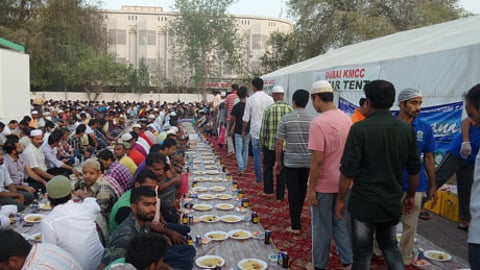Iftar at Dubai KMCC serves all
Over 1,500 people from all walks of life show up at massive community event

DUBAI It’s 10 minutes to seven on a balmy Saturday evening and you can feel the buzz as hundreds of worshippers wait in a kilometre long line. Finally when it is dusk officially and the prayers are heard, almost 1,500 end the day’s fast in unison. “This is how it has been here for the last four years, each day of the Ramadan,” says Ishfaq, one of the 140 volunteers at the Dubai Kerala Muslim Cultural Centre (Dubai KMCC) office that’s been organising this large scale community iftar since 2012.
“It does get a bit rushed but thanks to our big team, we pull it off nicely,” says Mohammad, another volunteer chaperoning the hordes of men pouring in by the minute as the evening wears on.
Malayalis and Tamils from India, Bangladeshis, Pakistanis, Sri Lankans, Africans and even Arabs – Muslims or non-Muslims – iftars at Dubai KMCC are for everyone, says Sajid Aboobacker, acting general secretary of the association in Al Baraha just behind Dubai Hospital. “Our doors are open for anyone walking in,” says the man from Kozhikode, Kerala. Last Friday, however, his guest list was not just restricted to the low to middle income earning expatriate workforces “We had top police officials, members from the Community Development Authority and Lulu chief M.A. Yusuf Ali, who is one of our patrons,” Aboobacker adds. “The menu remains the same,” he chuckles, pointing to the group of men from three Dubai restaurants busy lining up the tables. They pick up a scoop of rice on a platter from a giant pot and mix it up with a tender chicken piece. An energy drink, a juice, laban and some fruits make up the iftar plate. “The biryani is just too good. It’s fragrant, delicious and unlike the usual spicy ones we get back home, it’s really light on the stomach. I just love it,” says Mohammad Tariq, a pick-up van driver from Kohat near Peshawar in Pakistan.
Sign up for the Daily Briefing
Get the latest news and updates straight to your inbox


